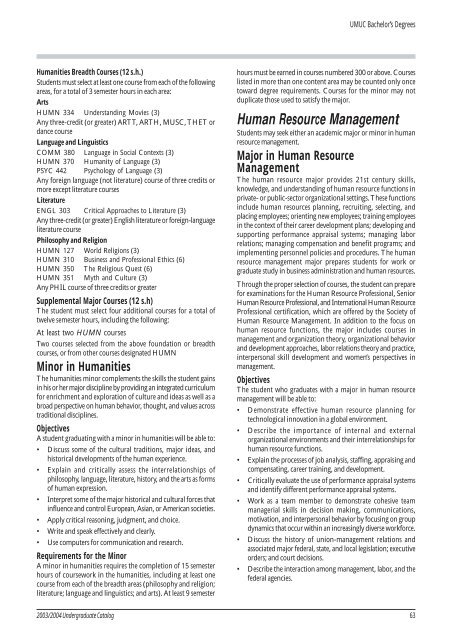Undergraduate - UMUC Europe
Undergraduate - UMUC Europe
Undergraduate - UMUC Europe
You also want an ePaper? Increase the reach of your titles
YUMPU automatically turns print PDFs into web optimized ePapers that Google loves.
Humanities Breadth Courses (12 s.h.)<br />
Students must select at least one course from each of the following<br />
areas, for a total of 3 semester hours in each area:<br />
Arts<br />
HUMN 334 Understanding Movies (3)<br />
Any three-credit (or greater) ARTT, ARTH, MUSC, THET or<br />
dance course<br />
Language and Linguistics<br />
COMM 380 Language in Social Contexts (3)<br />
HUMN 370 Humanity of Language (3)<br />
PSYC 442 Psychology of Language (3)<br />
Any foreign language (not literature) course of three credits or<br />
more except literature courses<br />
Literature<br />
ENGL 303 Critical Approaches to Literature (3)<br />
Any three-credit (or greater) English literature or foreign-language<br />
literature course<br />
Philosophy and Religion<br />
HUMN 127 World Religions (3)<br />
HUMN 310 Business and Professional Ethics (6)<br />
HUMN 350 The Religious Quest (6)<br />
HUMN 351 Myth and Culture (3)<br />
Any PHIL course of three credits or greater<br />
Supplemental Major Courses (12 s.h)<br />
The student must select four additional courses for a total of<br />
twelve semester hours, including the following:<br />
At least two HUMN courses<br />
Two courses selected from the above foundation or breadth<br />
courses, or from other courses designated HUMN<br />
Minor in Humanities<br />
The humanities minor complements the skills the student gains<br />
in his or her major discipline by providing an integrated curriculum<br />
for enrichment and exploration of culture and ideas as well as a<br />
broad perspective on human behavior, thought, and values across<br />
traditional disciplines.<br />
Objectives<br />
A student graduating with a minor in humanities will be able to:<br />
Discuss some of the cultural traditions, major ideas, and<br />
historical developments of the human experience.<br />
Explain and critically assess the interrelationships of<br />
philosophy, language, literature, history, and the arts as forms<br />
of human expression.<br />
Interpret some of the major historical and cultural forces that<br />
influence and control <strong>Europe</strong>an, Asian, or American societies.<br />
Apply critical reasoning, judgment, and choice.<br />
Write and speak effectively and clearly.<br />
Use computers for communication and research.<br />
Requirements for the Minor<br />
A minor in humanities requires the completion of 15 semester<br />
hours of coursework in the humanities, including at least one<br />
course from each of the breadth areas (philosophy and religion;<br />
literature; language and linguistics; and arts). At least 9 semester<br />
<strong>UMUC</strong> Bachelor’s Degrees<br />
hours must be earned in courses numbered 300 or above. Courses<br />
listed in more than one content area may be counted only once<br />
toward degree requirements. Courses for the minor may not<br />
duplicate those used to satisfy the major.<br />
Human Resource Management<br />
Students may seek either an academic major or minor in human<br />
resource management.<br />
Major in Human Resource<br />
Management<br />
The human resource major provides 21st century skills,<br />
knowledge, and understanding of human resource functions in<br />
private- or public-sector organizational settings. These functions<br />
include human resources planning, recruiting, selecting, and<br />
placing employees; orienting new employees; training employees<br />
in the context of their career development plans; developing and<br />
supporting performance appraisal systems; managing labor<br />
relations; managing compensation and benefit programs; and<br />
implementing personnel policies and procedures. The human<br />
resource management major prepares students for work or<br />
graduate study in business administration and human resources.<br />
Through the proper selection of courses, the student can prepare<br />
for examinations for the Human Resource Professional, Senior<br />
Human Resource Professional, and International Human Resource<br />
Professional certification, which are offered by the Society of<br />
Human Resource Management. In addition to the focus on<br />
human resource functions, the major includes courses in<br />
management and organization theory, organizational behavior<br />
and development approaches, labor relations theory and practice,<br />
interpersonal skill development and women’s perspectives in<br />
management.<br />
Objectives<br />
The student who graduates with a major in human resource<br />
management will be able to:<br />
Demonstrate effective human resource planning for<br />
technological innovation in a global environment.<br />
Describe the importance of internal and external<br />
organizational environments and their interrelationships for<br />
human resource functions.<br />
Explain the processes of job analysis, staffing, appraising and<br />
compensating, career training, and development.<br />
Critically evaluate the use of performance appraisal systems<br />
and identify different performance appraisal systems.<br />
Work as a team member to demonstrate cohesive team<br />
managerial skills in decision making, communications,<br />
motivation, and interpersonal behavior by focusing on group<br />
dynamics that occur within an increasingly diverse workforce.<br />
Discuss the history of union-management relations and<br />
associated major federal, state, and local legislation; executive<br />
orders; and court decisions.<br />
Describe the interaction among management, labor, and the<br />
federal agencies.<br />
2003/2004 <strong>Undergraduate</strong> Catalog 63






